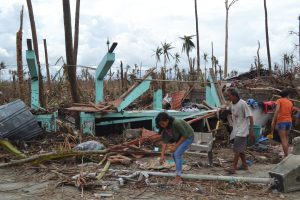Memo #252
(See Part 1 of this Memo)
By Leonora C. Angeles – nora.angeles [at] ubc.ca
 In the aftermath of Typhoon Haiyan, even as climate justice advocates raise concerns in regional and international arenas, post-disaster reconstruction and long-term recovery challenges confront Philippine local and national governments and civil society. There are some hard-learned lessons by international development agencies and other governments that the Philippines should consider in its own post-disaster reconstruction efforts in order to take advantage of the opportunities such misfortune presents.
In the aftermath of Typhoon Haiyan, even as climate justice advocates raise concerns in regional and international arenas, post-disaster reconstruction and long-term recovery challenges confront Philippine local and national governments and civil society. There are some hard-learned lessons by international development agencies and other governments that the Philippines should consider in its own post-disaster reconstruction efforts in order to take advantage of the opportunities such misfortune presents.
Housing losses account for some 80 percent of the damaged infrastructure from the storm. But such loss presents opportunities for addressing long-standing issues in urban land reform, including informal settlements tenure, unequal urban land distribution, poor land use planning and governance, urban farming policy, senior housing, and women’s land and housing rights. Resettlement only works in conditions where previous settlements were built on unsafe ground and where livelihoods, transportation, and socially and culturally appropriate solutions are considered in partnership with local communities. Post-disaster recovery efforts can also be used for building more climate-proof, disaster-resilient, and sustainable housing and other forms of infrastructure. While owner-driven reconstruction often works best, there are additional considerations for success, such as updating building codes, regulating prices of land and housing materials and providing financial assistance and training to home-builders and local governments.
Institutions and how they operate and govern still matter, especially in the wake of disasters such as Haiyan. The Philippines might consider creating a fully empowered Reconstruction Agency such as was established in Aceh, Indonesia following the 2004 tsunami. Or a selection or combination of various best practices and best-fit considerations may also work.
Whatever institutional form emerges, resilience and long-term awareness in planning and action in all areas—from land use, heritage preservation, anti-corruption campaigns, expansion of existing social safety net programs like the Pantawid Pamilyang Pilipino Program (4Ps or Conditional Cash Transfer), and institution-building—will be of key importance, along with the inclusivity dimensions noted in Part 1 of this memo. In addition, all of these plans and their implementation will need to navigate the currents of the continuing international wrangling between developed and developing countries over who should pay what to whom, how, how much, when and over which carbon emissions, as seen in the contentious debates at the recent Warsaw Climate Change Conference organized under the auspices of the United Nations Framework Convention on Climate Change.
About the Author:
Leonora C. Angeles is Associate Professor of Community and Regional Planning and Women’s and Gender Studies at the University of British Columbia and principal investigator of the SSHRC Partnership Development project, “Collaborative Governance of Urbanizing Watersheds: Integrated Research, Institution- and Capacity-Building for Sustainability and Climate Risk Adaptation in Angat River Region, Philippines.”
- “‘Safer Homes, Stronger Communities,” Disaster Risk Management-East Asia & Pacific, the World Bank
- Pantawid Pamilyang Pilipino Program (4Ps, or Conditional Cash Transfer)
- “Post Tsunami Reconstruction in Indonesia,” Global Urban Development Magazine, March 2006
- “Gender and Disaster Risk Reduction,” UNESCO
- “Framework Convention on Climate Change,” United Nations
Related Memos:
See our other memos on the Philippines.

Comments are closed, but trackbacks and pingbacks are open.